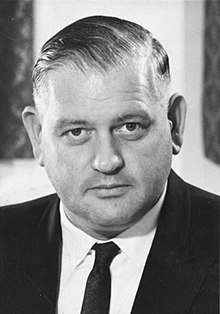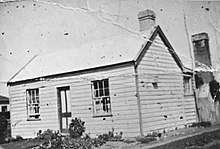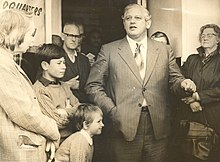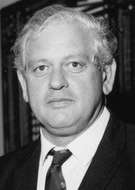Norman Kirk
Norman Eric Kirk PC (6 January 1923 – 31 August 1974) was a New Zealand politician who served as the 29th Prime Minister of New Zealand from 1972 until his sudden death in 1974.
Norman Kirk | |
|---|---|
 | |
| 29th Prime Minister of New Zealand | |
| In office 8 December 1972 – 31 August 1974 | |
| Monarch | Elizabeth II |
| Deputy | Hugh Watt |
| Governor-General | Denis Blundell |
| Preceded by | Jack Marshall |
| Succeeded by | Bill Rowling |
| 19th Leader of the Opposition | |
| In office 16 December 1965 – 8 December 1972 | |
| Preceded by | Arnold Nordmeyer |
| Succeeded by | Jack Marshall |
| 7th Leader of the New Zealand Labour Party | |
| In office 16 December 1965 – 31 August 1974 | |
| Preceded by | Arnold Nordmeyer |
| Succeeded by | Bill Rowling |
| 20th President of the New Zealand Labour Party | |
| In office 1964–1966 | |
| Preceded by | Martyn Finlay |
| Succeeded by | Norman Douglas |
| Member of the New Zealand Parliament for Lyttelton | |
| In office 1957 – 1969 | |
| Preceded by | Harry Lake |
| Succeeded by | Tom McGuigan |
| Member of the New Zealand Parliament for Sydenham | |
| In office 1969 – 1974 | |
| Preceded by | Mabel Howard |
| Succeeded by | John Kirk |
| Personal details | |
| Born | 6 January 1923 Waimate, Canterbury, New Zealand |
| Died | 31 August 1974 (aged 51) Wellington, New Zealand |
| Resting place | Waimate Lawn Cemetery, Waimate, Canterbury, New Zealand |
| Political party | Labour |
| Spouse(s) | |
| Children | 5, including John Kirk |
| Relatives | Jo Luxton (great-niece) |
| Profession | Railway engineer |
| Signature |  |
Kirk joined the New Zealand Labour Party in 1943. He was mayor of Kaiapoi from 1953 until 1957, when he was elected to the New Zealand Parliament. He became the leader of his party in 1964. Following a Labour victory in the 1972 election, Kirk became Prime Minister and Minister of Foreign Affairs. He stressed the need for regional economic development and affirmed New Zealand's solidarity with Australia in adopting a foreign policy more independent of the United States. In 1973, he strongly opposed French nuclear tests in the Pacific. He promoted racial equality at home and abroad; his government prevented the South African rugby team from touring New Zealand during 1973.
Kirk had a reputation as the most formidable debater of his time and once famously said that "there are four things that matter to people: they have to have somewhere to live, they have to have food to eat, they have to have clothing to wear, and they have to have something to hope for,"[1] often misquoted as "Someone to love, somewhere to live, somewhere to work and something to hope for."[2] Owing to his energy, charisma and powerful oratory, as well as his untimely death, Kirk remains one of the most popular New Zealand prime ministers.
Early life and family

Born in Waimate, a town in South Canterbury, New Zealand, Norman Kirk came from a poor background, and his household could not afford things such as daily newspapers or a radio.[3]
Kirk did not perform well at school, and left shortly before he turned thirteen.[4] Despite this, however, he enjoyed reading, and often visited libraries. In particular, he enjoyed the study of history and geography.
After leaving school, Kirk worked in a number of jobs, initially as an assistant roof-painter and later as a stationary engine driver, operating boilers in various factories. His health, however, deteriorated, and when the New Zealand Army called him up for military service in 1941 it found him medically unfit. After recovering somewhat, he returned to work, holding a number of different jobs.
In 1943, Norman Kirk married Lucy Ruth Miller, known as Ruth, who was born in Taumarunui. The couple had three sons and two daughters. In 1975 Ruth Kirk was named Dame Commander of the Order of the British Empire (DBE). In 1974, while her husband was Prime Minister, she became patron of the Society for the Protection of the Unborn Child. She took part in anti-abortion protest marches in Wellington and Hamilton. She died on 20 March 2000, aged 77.[5]
Early political career
Also in 1943, Kirk joined the Labour Party's branch in Kaiapoi, where he and his wife had decided to build a house. Kirk bought a 1,261 m2 (13,570 sq ft) section at 12 Carew Street for just NZ£40 (compared to today's land valuation of NZ$126,000).[6] Owing to a shortage of funds and building materials following World War II, Kirk built the house himself entirely, right down to the casting of the bricks. The house still stands today, albeit with an extension at the back and a hipped corrugated iron roof to replace the original leak-susceptible flat malthoid roof.[7]
In 1951, Kirk became Chairman of the party's Hurunui electorate committee. In 1953, Kirk led Labour to a surprising victory in elections for Kaiapoi's local council, and he became the youngest mayor in the country at age 30.[8]
As mayor, Kirk showed great creativity and implemented many changes. He surprised officials by studying issues intensely, often emerging with better knowledge of his options than the people functioning as his advisors. He resigned as mayor on 15 January 1958 and moved his family to Christchurch after being elected MP for the Lyttelton electorate.[3]
Member of Parliament
| New Zealand Parliament | ||||
| Years | Term | Electorate | Party | |
| 1957–1960 | 32nd | Lyttelton | Labour | |
| 1960–1963 | 33rd | Lyttelton | Labour | |
| 1963–1966 | 34th | Lyttelton | Labour | |
| 1966–1969 | 35th | Lyttelton | Labour | |
| 1969–1972 | 36th | Sydenham | Labour | |
| 1972–1974 | 37th | Sydenham | Labour | |
In 1954, Kirk stood as the Labour candidate for the Hurunui seat. While he increased Labour's share of the vote considerably, he did not win.[3] Following this, Kirk sought the Labour nomination for a by-election in Riccarton, but ultimately withdrew from the selection contest. He then turned his attention to winning nomination in the seat of Lyttelton, which Labour surprisingly lost to the National Party in a previous election. Kirk beat five better known and connected candidates including Mayor of Lyttelton Frederick Briggs and Lyttelton Borough Councillor Gladys Boyd for the nomination.[9] At the 1957 general election Kirk won the Lyttelton seat and became a Member of Parliament. In 1969 he transferred to the Sydenham seat which he held until his death.[4]
Throughout his political career, Kirk promoted the welfare state, supporting government spending for housing, health, employment, and education. As such, Kirk often appeared as a champion for ordinary New Zealanders. His working-class background also gave him some advantage, as ordinary voters saw many other politicians as out-of-touch and aloof.[4]
Gradually, Kirk began to rise through Labour's internal hierarchy, becoming vice-president of the Party in 1963 and president in 1964. At the end of 1965 he successfully challenged Arnold Nordmeyer for the parliamentary leadership, becoming Leader of the Opposition. Using the slogan "Make things happen",[10] Kirk led Labour into the 1969 general election — the party did not win a majority, but it did increase both its share of the vote and number of seats to 44.2% and 39.[11]

Prime Minister

In February 1972 Keith Holyoake resigned as Prime Minister and was replaced by Jack Marshall. Not even this could blunt Labour's campaign slogan, "It's Time – Time for a change, time for Labour",[12] and on 25 November 1972 Kirk led Labour to victory with a majority of 23 seats.[11]
Soon after entering office, Kirk acquired a reputation as a reforming figure. The conservative Dominion newspaper bestowed its 'Man of the Year' prize on him for "outstanding personal potential for leadership".[3] A few weeks later, on 6 February 1973, Kirk was photographed at a Waitangi Day event holding the hand of a small Māori boy;[13] the iconic picture seemed to symbolise a new era of racial partnership.
Kirk set a frenetic pace implementing a great number of new policies. In particular, the Kirk government had a far more active foreign policy than its predecessor, taking great trouble to expand New Zealand's links with Asia and Africa. Immediately after his election as Prime Minister, Kirk withdrew all New Zealand troops from Vietnam,[12] ending that nation's eight-year involvement in the Vietnam War. The Kirk government also abolished Compulsory Military Training (conscription) in New Zealand;[14] since then the New Zealand Defence Force has remained an all-volunteer professional force.
Two subjects in particular caused comment; one: Kirk's strong protest against French nuclear-weapons testing in the Pacific Ocean which led to his government, along with Australia, taking France to the International Court of Justice in 1972 and him sending two New Zealand navy frigates, HMNZS Canterbury and Otago, into the test zone area at Mururoa Atoll in a symbolic act of protest in 1973.[15][16] The other: his refusal to allow a visit by a South African rugby team, a decision he made because the apartheid régime in South Africa would not accept racial integration for that sport.[17] He was also highly critical of US foreign policy, speaking before the United Nations of the US involvement in the coup d'état in Chile in 1973.[18]
The Kirk government was also notable for a number of national identity building policies. The government began the tradition of New Zealand Day in 1973,[13] and the government introduced legislation in 1974 to declare Elizabeth II as Queen of New Zealand.[19]
Kirk appointed Bill Rowling as Minister of Finance. The Labour government enjoyed a record budget surplus in its first year and revalued the currency. However, the slowing global economy, an unprecedented rise in oil prices and a rapid rise in government expenditure led to soaring inflation by 1974.[14]
Illness and death
.jpg)
During his time as Prime Minister, Kirk kept up an intense schedule, refusing to reduce his workload by any significant degree and rarely taking time off (the Chatham Islands was his favourite retreat). Kirk ignored advice from several doctors and from Bob Tizard and Warren Freer to "take care of himself" and to reduce his heavy consumption of Coca-Cola and alcohol (beer, plus later whisky or gin), saying he would have a "short but happy life". [20] Though a non-smoker, he had diabetes and dysentery.
By 1974 he had difficulty in breathing, eating and sleeping. In April he had an operation to remove varicose veins from both legs at once despite advice to have two operations. Doctors and colleagues were urging him to take time off; on 26 August Social Credit leader Bruce Beetham advised him to take a couple of months off to recover. His final public appearance was on 18 August to open St Peter's Catholic College in Palmerston North, when he stood in the rain for the whole ceremony, and he missed a proposed debate with Robert Muldoon before interviewer David Frost.[21]
On 15 August 1974 he decided to take two days off, and on 26 August he decided to have six weeks of complete rest. He had been checked over by many doctors, and an examination by Professor Tom O’Donnell on 27 August confirmed that he had an enlarged heart gravely weakened by embolisms, and which was not pumping regularly enough to get sufficient oxygen into his bloodstream; one lung was two-thirds incapacitated by the clot; and his stomach was very sore as his liver was swollen with retained fluid. He went into the Home of Compassion Hospital, Island Bay, Wellington on 28 August. He was photographed going in the boilerhouse door to avoid the media at the front. He rang and reminisced with close colleagues, and his bed was covered with official papers. On Saturday 31 August he told his wife Ruth, who had been told of his serious situation and came to Wellington, "I am dying .. please don't tell anyone". Soon after 9 pm, while watching a police drama on television (Softly, Softly: Taskforce with Stratford Johns on NZBC TV), he slowly slid from a sitting position. He died of a pulmonary embolism when a blood clot released from a vein into his heart cut off the blood flow and stopped the heart. O'Donnell signed his death certificate.[21] Upon Kirk's death, Bill Rowling succeeded him as Prime Minister.
While colleagues had been urging him to take some time off, none were aware of the seriousness of his last illness.[22] Bob Harvey, the Labour Party President, said that Kirk was "a robust man" with the "constitution of a horse". He proposed a Royal Commission to investigate rumours that he had been killed, perhaps with contact poison, by the CIA. This story returned during the 1999 visit of American President Bill Clinton to New Zealand.[23]
Funeral
After a lying-in-state in Parliament House from 2 to 4 September, there was a large official funeral in Wellington Cathedral of St Paul, on Wednesday 4 September attended by Prince Charles and Australian Prime Minister Gough Whitlam; then on 5 September another service, also inter-denominational, in the Christchurch Town Hall followed by a simple burial service in his hometown Waimate. He was buried near his mother's grave; the burial service was delayed as the RNZAF Hercules could not land at Waimate and the procession hurried by road to meet the daylight requirement for burials. Memorial services were held around New Zealand, and on 26 September in Westminster Abbey, London.[24]
He was succeeded as Prime Minister by Bill Rowling and in the Sydenham electorate by his son John Kirk, who won the resulting by-election in November 1974.[25]
Popular culture
The New Zealand pop band Ebony wrote the song "Big Norm", featuring tongue-in-cheek lyrics praising Kirk. In 1974, it reached No 4 in the charts and Ebony won a New Zealand music RATA award for group of the year. The last telegram Kirk sent before his death was to Ebony congratulating them on their win.[26]
See also
References
- Andrews, George (1 August 2020). "The famous words that Norman Kirk did not say". The Spinoff. Retrieved 1 August 2020.
- "Election essay: The town that's used to being disappointed". BBC News. 23 March 2015. Retrieved 23 March 2015.
- Bassett, Michael. "Kirk, Norman Eric". Dictionary of New Zealand Biography. Ministry for Culture and Heritage. Retrieved 8 November 2012.
- Bassett, Michael. "Norman Kirk Official Biography – Archives New Zealand. Te Rua Mahara o te Kāwanatanga". archives.govt.nz. Retrieved 29 December 2017.
- "Kiwis who left their mark on the nation". The New Zealand Herald. 30 December 2000. Retrieved 1 November 2011.
- "Rating enquiry – 12 Carew Street, Kaiapoi – Waimakariri District Council". Retrieved 20 September 2010.
- "Norman Kirk's House (Former)". Register of Historic Places. Heritage New Zealand. Retrieved 20 September 2010.
- Broun, Britton (11 October 2010). "Porirua's new mayor New Zealand's youngest". Dominion Post. Retrieved 29 October 2010.
- "Labour's Selection for Lyttelton Seat". The Evening Post. 18 July 1957. p. 18.
- Bassett, Michael (2000). "Kirk, Norman Eric". Dictionary of New Zealand Biography. Retrieved 24 February 2018.
- "General elections 1890–1993". Electoral Commission. Archived from the original on 30 December 2015. Retrieved 24 February 2018.
- "1972 – key events". Ministry for Culture and Heritage. 23 January 2015. Retrieved 24 February 2018.
- McLean, Gavin (8 November 2017). "Norman Kirk". Ministry for Culture and Heritage. Retrieved 24 February 2018.
- Aimer, Peter (1 June 2015). "Labour Party – Second and third Labour governments". Te Ara – the Encyclopedia of New Zealand. Retrieved 24 February 2018.
- Mururoa Nuclear Tests, RNZN protest Veterans Archived 23 July 2011 at the Wayback Machine
- Disarmament and Security Centre – Publications – Papers Archived 13 February 2009 at the Wayback Machine
- "Stopping the 1973 tour". Ministry for Culture and Heritage. 13 August 2014. Retrieved 24 February 2018.
- "Norman Kirk – The Mighty Totara". Stuff. 10 March 2014. Retrieved 29 December 2017.
- Peaslee, Amos J. (1985). Constitutions of Nations (Rev. 4th ed.). Dordrecht: Nijhoff. p. 882. ISBN 9789024729050.
- Freer 2004, pp. 113,195.
- Grant 2014, pp. 380–1, 389–400.
- Grant 2014, p. 403.
- Phillips 2014, pp. 114–117,153–156.
- Grant 2014, pp. 405–417.
- "Parliamentary Debates". Hansard. New Zealand Parliament, House of Representatives. 23 April 1975.
- Hunt, Tom (25 August 2012). "A nation mourned when we lost Big Norm". The Dominion Post. Retrieved 24 February 2018.
Bibliography
- Freer, Warren W (2004). A Lifetime in Politics: the memoirs of Warren Freer. Wellington: Victoria University Press. ISBN 0-86473-478-6.CS1 maint: ref=harv (link)
- Grant, David (2014). The Mighty Totara: The life and times of Norman Kirk. Auckland: Random House. ISBN 9781775535799.CS1 maint: ref=harv (link)
- Phillips, Hazel (2014). Wild Westie: the incredible life of Bob Harvey. Auckland: Penguin. ISBN 9781743486764.CS1 maint: ref=harv (link)
Further reading
- Hayward, Margaret (1981). Diary of the Kirk Years. Auckland: Reed Publishing. ISBN 0589013505.
External links
| Wikimedia Commons has media related to Norman Kirk. |
| Government offices | ||
|---|---|---|
| Preceded by Jack Marshall |
Prime Minister of New Zealand 1972–1974 |
Succeeded by Bill Rowling |
| New Zealand Parliament | ||
| Preceded by Harry Lake |
Member of Parliament for Lyttelton 1957–1969 |
Succeeded by Tom McGuigan |
| Preceded by Mabel Howard |
Member of Parliament for Sydenham 1969–1974 |
Succeeded by John Kirk |
| Political offices | ||
| Preceded by Owen Hills |
Mayor of Kaiapoi 1953–1958 |
Succeeded by Charles Thomas Williams |
| Party political offices | ||
| Preceded by Martyn Finlay |
President of the Labour Party 1964–1966 |
Succeeded by Norman Douglas |
| Preceded by Arnold Nordmeyer |
Leader of the Labour Party 1965–1974 |
Succeeded by Bill Rowling |
